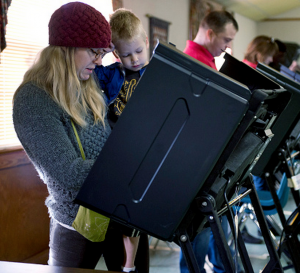This morning I woke up to see yet another story about soldier suicides — this one about a Vietnam veteran. This story comes even as the Army has launched a renewed wave of suicide prevention training. In my reserve unit, I’ve sat through at least four sessions in the last six weeks, and the tone grows ever more urgent and frantic. Simply put, nothing is working, and the death toll from suicide is now dwarfing the death toll from combat.
As you would expect, the explanations usually begin and end with PTSD. But it’s more than that, much more. After all, suicide rates are surging even as combat winds down, and the rates are apparently surging above those of past wars — wars where soldiers suffered even greater rates of death and injury. We also know what PTSD is and have good ideas about treating it or at least mitigating its effects. As an Iraq vet, I can testify that the Army generally asks early and often about potential PTSD symptoms (though it can be spotty about following up). Yet still suicides mount.
Why?
I can think of at least three reasons: Broken families, broken dreams, and broken care.
1. Soldiers increasingly come from — and return to — broken homes. Even without the stresses of deployment and prolonged separation, our culture is struggling to preserve the basic family unit. Young soldiers come from unstable families, form unstable families (often by having children out of wedlock), and then leave for month after month — hoping and expecting that these fragile families hang together long enough for them to return. Army lawyers “downrange” sometimes have to draw charts to figure out the complex family relationships implicated when a “baby momma” strays or when a mom takes off with a new man (still clutching her soldier son’s power of attorney). Simply put, the “Dear John” letter — long a staple of soldiers’ combat experience — is now a “Dear John” Facebook post, text message, or phone call. And they come with increasing, terrifying frequency.
Even worse, spousal or girlfriend/boyfriend betrayal is often at the hands of fellow soldiers. The modern American military base is a hive of activity, with families surrounded by soldiers coming, going, training, and visiting. Lonely wives and girlfriends suffer from no shortage of alternatives, and stateside soldiers are often shamefully enthusiastic about offering a shoulder to cry on.
How serious is the problem? It’s tough to say with certainty, but during my own deployment I was stunned at the extent of the family collapses. And every single attempted, threatened, or completed suicide that I’ve encountered in my Army career was immediately precipitated by trouble at home. Every single one.
2. Soldiers suffer from broken dreams — a vast gulf between expectations and reality. In hindsight I’m ashamed by my own naiveté. As my deployment wound down, dreams of home life began to dominate my mind. I would be reunited with my loving, supportive wife (she was both), throw my arms around two great kids (that was before we adopted), and experience a renewed zeal and appreciation for life — proud of my service. Instead, I came home a mess. I was grieving — our unit suffered heavy casualties, and the grief that I’d put aside to do my job came rushing on me in the quiet of our home. I was a ball of anxiety — almost of full year of tension and fear doesn’t release overnight. And, finally, I was angry. I hated our enemy — a white-hot hate — and for a time literally could not be in the same room with someone who questioned the rightness of our fight. I had seen the atrocities, I had learned the enemy’s mind, and a vast gulf existed between me and those who often sneeringly and condescendingly denied realities I’d experienced firsthand.
Even worse, these feelings simply didn’t go away with time. Sure, they may have lessened from day to day, but they didn’t disappear, everything wasn’t “ok,” and I had no idea how to deal with it. I was thankful for the grief because it kept (and keeps) me from forgetting those we should never forget. But the anxiety and the rage? Those I could do without.
I finally had to accept that — for better and for worse — I was never, ever going to be the person I was before the war. I had permanently changed. And I had changed without enduring the difficulties that most of my brothers endured, or that hundreds of thousands of others have endured. I was just a JAG officer, after all, not a cavalry scout or infantry platoon leader. And I was physically intact — coming home without a scratch (well, except for the nose I broke through my own stupidity).
Do we prepare our young soldiers for permanent change? Do we tell them that they will never be the same? That one consequence of their service will be a lifetime of memories, struggles with emotions they can’t always control, and a feeling of alienation from a culture that largely can’t understand their experience? Or do we encourage them to believe that everything will be ok, that re-integration — while difficult — will eventually be complete? I would say that no soldier emerges from war completely unscathed, every soldier is changed in some way, and some are changed more than others. We must prepare soldiers for that change, or for a small percentage broken dreams of peace and happiness lead to dark and dangerous thoughts.
3. Soldiers receive broken care from a bureaucracy that can’t heal hearts. While thousands of health care professionals are doing their best, a bureaucracy is a poor vehicle for repairing broken hearts and minds. I’ve seen too many soldiers treated with a pile of pills, with once lively personalities deadened by drug cocktails that include anti-depressants, painkillers, anti-anxiety medicines, and sleep aids. Sometimes I wonder if Ambien isn’t the official Army drug.
But what’s the alternative? I had a loving wife, supportive friends, a pastor who cared — just about the most ideal support system one could construct. Other soldiers have less than nothing — spouses who betray them, friends who abandon them, and no church to call home. The bureaucracy is all they have, and that’s a heartbreaking thought.
What can we do? As a soldier, I can vow to never, ever break faith with my brothers. To sustain them, to be strong when they are weak, and to understand and listen when no one else can. The soldier’s creed demands that we never leave a fallen comrade, but those are too often mere words — especially when soldier infidelity actually creates casualties.
As a church, I think it means two things: First, it means reaching out to military families, even those families who don’t actually darken the door of your worship center. Second — and perhaps more critically — it means more Christians need to serve. The military protects the liberty of a church whose members increasingly won’t fight themselves. Who’s better-equipped to go to war? Those with fragile families, fragile faith, and faithless friends? Or those with spouses bound together by a covenant, sustained by an eternal hope, and supported by the body of Christ?
Finally, as a nation, I simply don’t have any answers. Our institutions are rightfully scrambling to do better, but for the reasons outlined above, bureaucracies tend to be poor caregivers. And a fracturing culture — together with fracturing families and marriages — take an enormous toll on the human heart. I know that we can do better . . . I just don’t know how.










